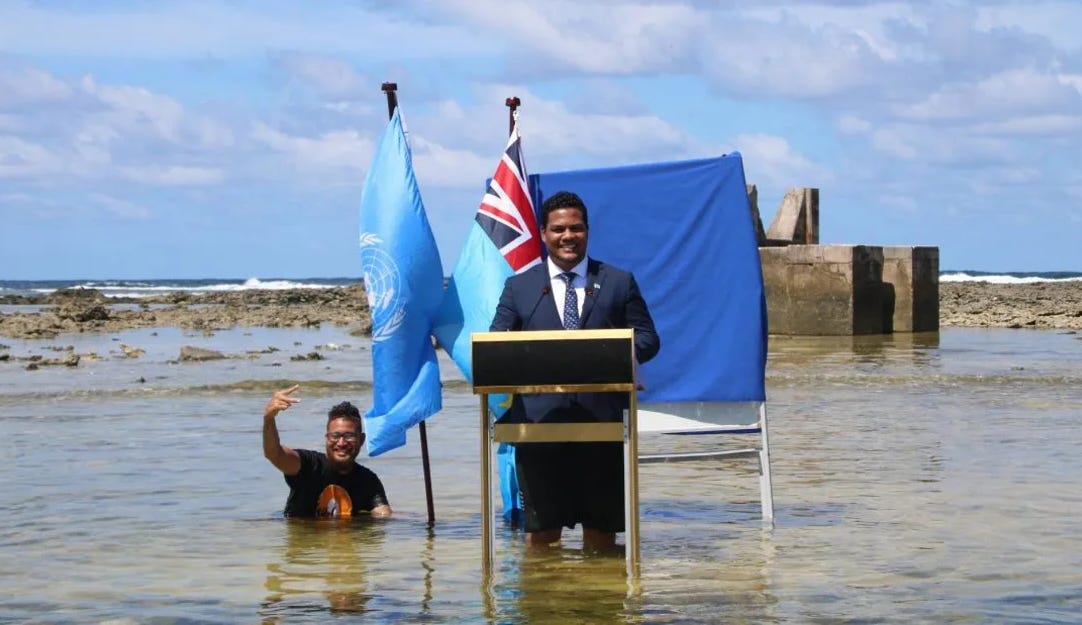How a small nation plans to live forever
A story, quote and lesson about preserving your identity
What is a country?
International law defines sovereign states as having a permanent population, a government not under another, the capacity to interact with other states and a defined territory. Most countries meet these requirements with ease, especially having a population and territory (as these are tangible and observable characteristics).
This includes the small island nation of Tuvalu. Located in the Pacific, about halfway between Hawaii and Australia, it is the second smallest nation in population (~11,900 people in 2021, only behind Vatican City). Tuvalu’s territory is equally modest—just 26 square kilometers spread across nine islands. But unlike most countries, Tuvalu is facing a unique crisis that threatens its very existence: rising sea levels.
As global temperatures climb, so do the oceans. And for Tuvalu, where the highest point is just 15 feet above sea level, this means their land could one day vanish beneath the waves. This isn’t a hypothetical situation—it’s already happening. Coastal erosion, higher tides, and saltwater intrusion are gradually making life harder for the people of Tuvalu. Soon, their land may be uninhabitable. What happens to a country when its territory disappears?

In an unprecedented move, Tuvalu is reimagining what it means to be a nation. Rather than waiting to be swallowed by the sea, they have chosen to preserve their culture, history, and identity in the digital realm. Their plan? To become the world’s first digital nation, living on in the metaverse long after the islands themselves may be gone.
This digital transformation isn’t just about survival—it’s about adaptation. The .tv domain, a little-known asset for most of the world, has been Tuvalu's digital goldmine. Generating 8.4% of the nation's GDP in 2019, this internet domain (often used by video streaming services) provides Tuvalu with much-needed revenue to fund this ambitious project. In a world where a few letters on the web can hold immense value, Tuvalu is using the resources it has to secure its future in a virtual space.
“The fate of our homeland is in your hands, but the fate of our country is in ours.”
Hon. Simon Kofe, Minister for Justice, Communication & Foreign Affairs of Tuvalu
The challenge Tuvalu faces, however, is more than technical. It’s existential. Can a nation truly survive without land? Can culture, history, and identity exist in a space that isn’t physical? These are the questions Tuvalu is grappling with, and in doing so, they are forcing the world to rethink what it means to be a country in the 21st century.
Just as Tuvalu is adapting to the looming reality of rising seas, it serves as a reminder that preservation is not always about keeping things exactly as they are. Sometimes, it’s about finding new ways to hold onto what’s important—whether that means embracing technology, redefining identity, or challenging long-held assumptions about what is truly permanent.
In the face of overwhelming challenges, sometimes the key to survival is not resistance, but adaptation. Tuvalu is demonstrating that when faced with the threat of erasure, the most powerful thing you can do is to create new ways of preserving what matters most.
So now I ask you:
What parts of your identity or legacy are worth preserving? Is there anything you’d rather leave behind to be washed away by the rising tide?



My family is my precious jewel to be preserved.
This article reminded me about many business examples that were clear leaders or strong business that never adapted and lost . Examples like blackberry, Xerox, Kodak. But there are some that have adapted like IBM to current world challenges. One thing that I find challenging to adapt is to the new ways of marketing product in this digital world